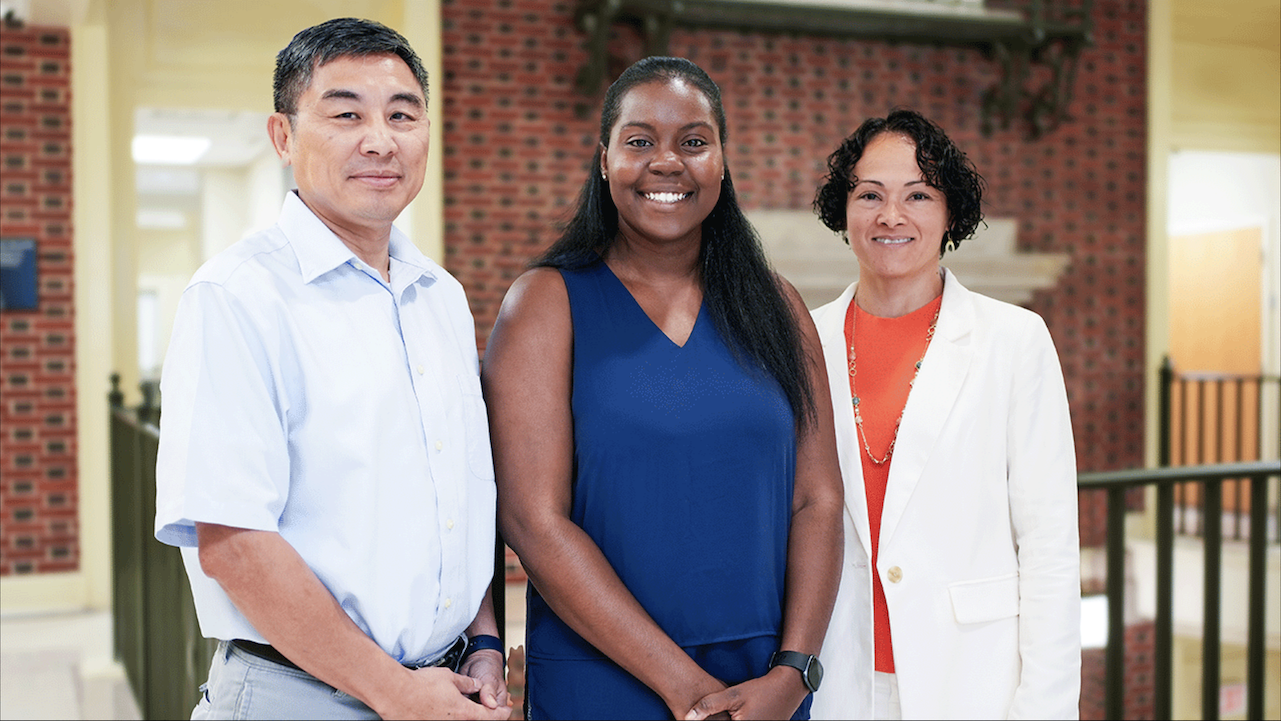
Mismanaged micro- and nano-plastics can threaten the health and environment. Three researchers in Auburn University’s Department of Chemical Engineering — Assistant Professor Symone Alexander, Department Chair Selen Cremaschi and Associate Professor Zhihua Jiang — offer solutions that could reimagine the sustainable development of plastic materials; address plastic waste challenges and its climate/health impacts; and build community climate resilience while advancing social and environmental justice in Mississippi and Alabama.
Their multi-disciplinary study, “Advancing social and environmental equity through plastics research: education, innovation and inclusion” (ASPIRE), is a collaborative effort with researchers from the University of Southern Mississippi, and part of a four-year, $4 million National Science Foundation — Department of Energy Established Program to Stimulate Competitive Research R-II Track-2 grant. These grants are awarded to researchers looking to advance climate change research and resilience capacity to expand opportunities for disproportionately affected communities.
“We’ve heard of islands of trash in the ocean, but what we don’t see are micro- and nano-plastics,” said Alexander, Auburn’s principal investigator (PI).
“Those are the very small particles that can easily be ingested by fish and marine animals, which we, as humans, ingest. This can lead to bioaccumulation that can cause other health issues which aren’t well studied.”
ASPIRE will develop advanced detection methods to analyze microplastic contamination in field and aquaculture samples, utilize novel methods to extend the lifespan and improve the performance of recycled products for sustained use and design recyclable polymer thermosets using sustainable, bio-derived building blocks to establish chemistry-structureproperty relationships.
They also want to address the lack of recyclable materials known as thermosets, like rubber and epoxy, which cannot be melted and formed into new materials after use.
How? With dynamic compatibilizers and lignin, an organic polymer found in plants that Alexander considers, “the glue that holds cellulose together.” In this case, lignin can be used to hold materials — such as plastics — together.
As a co-PI on the project, Cremaschi focuses on design optimization to assess economic feasibility and improve the competitiveness of the team’s proposed solutions to the problem.
“Our role — working with collaborators — is to perform a techno-economic analysis to assess competitiveness of our proposed solutions among each other and against existing technologies,” she said. “Once we have the models in place for simulation of the processes, then we quickly study different processes to improve the technoeconomic competitiveness of our solutions.”
Jiang, director of the Alabama Center for Paper and Bioresource Engineering, will serve as a senior personnel on the project and brings his vast understanding of lignin and experience in lignin separation to identify efficient lignin extraction processes.
Other ASPIRE thrusts include technology transfer and educational components in Mississippi and Alabama.
“We will both be working with industry partners for technology transfer, but we also want to showcase the latest technologies for these coastal communities,” Alexander added, citing the Gulf Blue Initiative, a University of Southern Mississippi program which “pools the knowledge of research scientists, federal agencies, industry partners and entrepreneurs to further develop the region as a global leader in ocean- and maritime-related technologies.”
Alexander is excited to make an impact on industry, society and health.
“Many of these health concerns affect people who look like me, or who come from a similar economic background,” she said. “They don’t always receive the same level of rigorous filtration when it comes to treating drinking water, or when it comes to addressing the lack of employment.
“It’s extremely important to me because communities that aren’t well served in terms of city planning, drinking water or availability of resources suffer most from health impacts related to pollution. A large part of this project is leading more in-depth studies on the impact of plastic pollution on waterways and health of coastal communities in Mississippi and Alabama.”